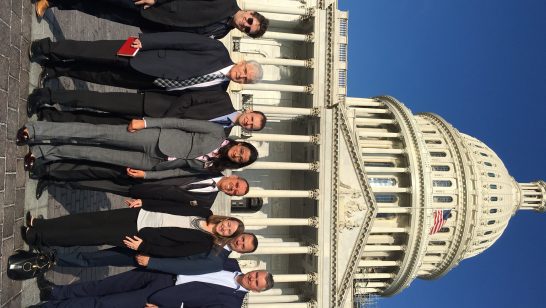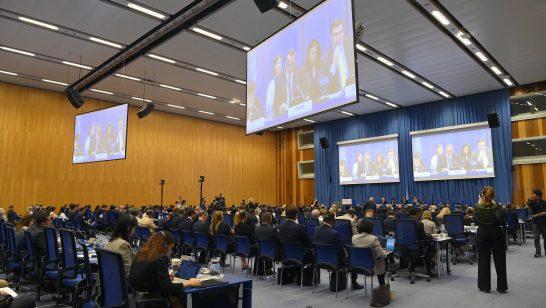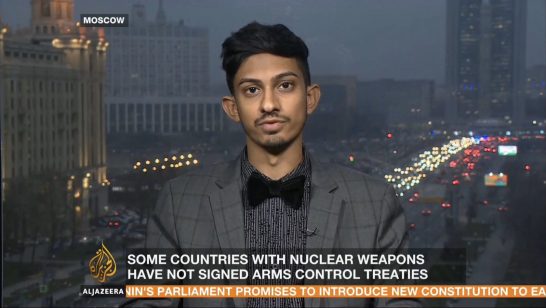
With the unlawful annexation of Crimea, relations between the West and Russia have reached a post-Cold War low and European security is back in the headlines. U.S. President Obama’s Prague vision of a world free from nuclear weapons sounds strange and out of place in the current non-cooperative environment. Some might even question its very goal and, therewith, arms control and disarmament policies in general.
So – is his vision, and indeed wider efforts at arms control dead long before achieving its ultimate goal?
Before historians ultimately come to answer this question, current security policies will need to concentrate on a number of more pressing issues. Amongst them is the critical question of what the future goals of arms control policies in a largely hostile West-Russian relationship should be in the upcoming months and years.
To answer that question, first, a central lesson learnt from the times of the Cold War could now be important. Even during the darkest days of that period, the two blocs were able to maintain existing and even agree on new stabilizing instruments, which helped to prevent the cataclysmic scenario of a nuclear exchange. While today’s situation is far from being comparable to the Cold War current arms control policies should concentrate, first and foremost, on the mutual maintenance and implementation of existing and successful stabilizing instruments, such as New START, INF, or the OSCE’s Vienna Document. A departure from those instruments would only further weaken efforts to halt the precarious downward spiral in relations.
A second goal for the next few years should be to re-engage on issues that were already deadlocked long before the current crisis. Conventional arms control in Europe (most obviously the moribund CFE Treaty), further strategic reductions, transparency on tactical nuclear weapons, or the unsuccessful attempt to cooperate on the build-up of a missile defence system for European NATO allies, have all suffered from a return to zero-sum thinking in Moscow, an environment in the U.S. Senate almost hostile to arms control, and diverging national agendas within NATO. Their negative impact on West-Russian relations will certainly not disappear over the coming years, but most likely contribute to further increasing tensions. The question is, whether policy-makers will decide to tackle them in a cooperative or a fait accompli manner.
A third goal which has, in essence, always been key to fully understanding arms control policies, should be to increase national security while reassuring allies and partners. Particularly in the realm of European security, some important players have lost sight of that goal of arms control. Cooperative instruments to prevent a relapse into confrontational behaviour have undergone a process of erosion for more than a decade, mostly out of the limelight. A functioning regime of cooperative arms control in Europe could help to increase transparency and, thereby, to regain more predictability. It could contribute to easing existing tensions through reciprocal commitments to, for instance, limit conventional deployments in specific sub-regions of heightened tensions. While a considerable number of NATO allies have good reason to call for more military reassurance in the current environment, it is just as much the time to think about supporting measures in the sphere of arms control to prevent a possible costly and incalculable arms race between the West and Russia. Again, policy-makers will have to decide whether they will opt solely for military reassurance, whether they are seriously seeking benefits from arms control or whether they will decide on a balanced mix of those two important pillars of a comprehensive security agenda.
A fourth goal should be to keep in mind the already existing and possibly increasing negative ramifications of the current crisis on multilateral arms control, disarmament, and non-proliferation efforts. The NPT, in particular, has already been affected by Russia’s actions in Ukraine, as the annexation of Crimea is a clear breach of Russian commitments given under the 1994 Budapest Memorandum. Even without the gift of clairvoyance, it is safe to say that Moscow will get serious criticism at the next NPT Review Conference in 2015. Beyond the immediate effects, NPT non-nuclear weapons states will correctly pose the question about the continuing disarmament obligations of the United States and Russia under Article VI of the Treaty and the future policies directed at achieving them. Simply pointing to the implementation of New START will not be enough to reassure the vast majority of states – not in 2015, let alone 2020.
To finally answer the question as to whether President Obama’s Prague vision is dead, one simply has to consider the four points above and calculate the political and economic costs of a decade of inaction on the arms control front. Without maintaining existing instruments, mutual predictability will be lost. Without renewed efforts to engage on arms control in general and cooperative arms control in Europe in particular, security policies will be achieved almost exclusively by costly military commitments. Finally, without taking into account the nexus between existing multilateral nuclear disarmament obligations and joint efforts to forestall nuclear proliferation, particularly the latter might suffer significantly.
All in all, President Obama’s Prague vision has lost none of its validity, as the reasons for laying out that vision have not disappeared. Nevertheless, events on the ground have virtually ensured that it will become harder in the years ahead to achieve significant steps leading towards the ultimate goal of a world free from nuclear weapons. We may all ultimately pay the price of that reality.
The opinions articulated above represent the views of the author(s), and do not necessarily reflect the position of the European Leadership Network or any of its members. The ELN’s aim is to encourage debates that will help develop Europe’s capacity to address the pressing foreign, defence, and security challenges of our time.



